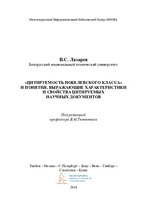| dc.contributor.author | Лазарев, В. С. | ru |
| dc.coverage.spatial | Тамбов | ru |
| dc.date.accessioned | 2018-10-04T11:07:02Z | |
| dc.date.available | 2018-10-04T11:07:02Z | |
| dc.date.issued | 2018 | |
| dc.identifier.citation | Лазарев, В. С. «Цитируемость нобелевского класса» и понятия, выражающие характеристики и свойства цитируемых научных документов = Nobel class citedness level and the notions that designate characteristics and properties of cited scientific documents / В. С. Лазарев; под ред. В. М. Тютюнника. – Тамбов : МИНЦ «Нобелистика», 2018. – 70 с. | ru |
| dc.identifier.isbn | 978-5-86609-216-1 | |
| dc.identifier.uri | https://rep.bntu.by/handle/data/47989 | |
| dc.description.abstract | Утверждение, что в показателях цитируемости отображается «нобелевский класс» учёного, представляется само собой разумеющимся. Однако для принятия его за безусловную истину должно быть найдено соответствие между характеристикой (свойством), адекватно отображаемой (-ом) цитируемостью, и характеристикой, обуславливающей присуждение Нобелевских премий по науке. Непосредственно отображаемой цитируемостью характеристикой является использование научных документов учёными, а отображаемым этой характеристикой свойством является ценность научных документов для учёных. В то же время характеристикой, обусловливающей присуждение Нобелевских премий, является польза («benefit»), принесённая человечеству. Это принципиально разные свойства, относящиеся к принципиально разным мегаобъектам. (Более того, ценные в научном отношении открытия могут быть вредными для человечества). Это несоответствие сознательно или интуитивно преодолевают неправомочной подменой понятия «ценность» (цитируемых научных документов) понятиями «воздействие» («impact», на русский язык часто переводится как «вклад»), «качество», «польза» (цитируемых научных документов) и т.д. Показано, что понятие качества цитируемых научных документов наилучшим образом соотносится с понятием пользы, принесённой человечеству. Однако качество научных документов, вопреки распространённейшему мнению, не отображается в цитируемости. Зато статистика совпадений экспертной оценки качества научных документов и их цитируемости (оценки их ценности на основании цитируемости) убеждает, что уровень цитируемости может быть при необходимости принят за такой показатель (proxy) их качества, использование которого основано не на причинно-следственных связях, а на вероятностных. (При этом в редких случаях т.н. «отрицательного цитирования» отражается ценность цитируемого документа при низкой оценке его качества). С учётом понимания того, что причинно-следственных связей между цитируемостью и качеством нет, но цитируемость все-таки может быть использована как вероятностный показатель качества, следует признать обоснованность исследований «нобелевского класса» с помощью показателей цитируемости. Подробно рассмотрено понятие «воздействие» (“impact”) научных документов, рассмотрены такие свойства научных документов как «значимость» (“significance”), «важность» (“importance”), «пертинентность», «полезность» (“usefulness”), возможности их оценивания на основании данных о цитируемости, соотнесённость их с понятием «польза (“benefit”), принесённая человечеству». | ru |
| dc.language.iso | ru | ru |
| dc.publisher | МИНЦ «Нобелистика» | ru |
| dc.title | «Цитируемость нобелевского класса» и понятия, выражающие характеристики и свойства цитируемых научных документов | ru |
| dc.title.alternative | Nobel class citedness level and the notions that designate characteristics and properties of cited scientific documents | en |
| dc.type | Book | ru |
| local.description.annotation | The claim that the citedness magnitudes show the «Nobel class» of the scientist seems to be self-evident. However, to accept it as an absolute truth, a correspondence must be found between the characteristic (property) adequately reflected by citedness and the characteristic that determines the award of the Nobel Prizes in science. The characteristic that is directly reflected by the citedness is the use of scientific documents by scientists; the use, in its turn, r eflects the value of scientific documents for scientists. At the same time, the characteristic that determines the award of Nobel Prizes is the benefit brought to the mankind. These are fundamentally different properties related to fundamentally different mega-objects. (Moreover, some discoveries valuable in the scientific sense might be harmful for the mankind.) This discrepancy is consciously or intuitively overcome by arbitrary su bstitution of the concept of the notion of «value» (of cited scientific documents) with the notions of «impact», «quality», «usefulness» (of cited scientific documents) etc. It is shown that the concept of the «quality» of cited scientific documents is the best to correspond with the notion of «benefit to the mankind». However, the quality of scientific documents, contrary to popular belief, is not reflected by citedness. But the statistics of coincidence of the results of expert evaluation of the quality of scientific documents and their citedness (evaluation of their value on the basis of citedness) demonstrates that the level of citedness can be taken as a proxy indicator of their quality. (The use of the proxy indicator is based not on causal relations, but on probabilistic ones.) In rare cases of the so -called «negative citedness» the value of the cited document is reflected, while its quality is being assesses as low. Taking into account the understanding that there are no causal relations between citation and quality, citedness can still be accepted as a probabilistic (proxy) indicator of quality; and, being such an indicator, it may be accepted for studying «Nobel class» of the scientists by their citedness level. Discussed in detail is the concept of «impact» of scientific papers, considered are such properties of scientific papers as «significance», «importance», «pertinence», «usefulness», as well as the ability of their evaluat ion on the basis of the citedness. The correspondence of these characteristics to the notion of «benefit brought to the mankind» is under critical analysis. | en |

